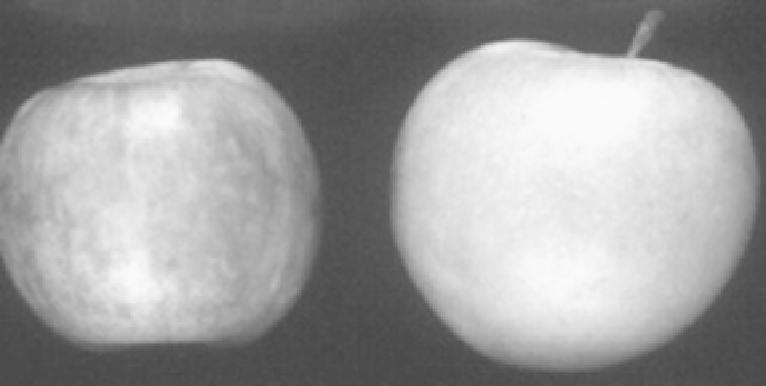Agriculture Reference
In-Depth Information
Fig. 7.3
Superficial scald on “Granny Smith” apples and its prevention by 1-MCP treatment at harvest. The
apples were stored for 5 months at 0
◦
C and held 5 days at 20
◦
C.
peel in apple and as black patches on pear. Superficial scald has also been termed as a
chilling-injury symptom as it occurs during low-temperature storage (Watkins et al., 1995).
Mechanistically, the accumulation of
-farnesene and its oxidation to conjugated trienols
in the peel region and associated cell damage is believed to cause the development of this
symptom (Rowan et al., 1995; Whitaker et al., 1997).
α
-Farnesene production is enhanced
by ethylene (Du and Bramlage, 1994; Watkins et al., 1995; Whitaker et al., 2000). Superficial
scald can be prevented or alleviated by inhibiting
α
-farnesene production or its oxidation.
It has been demonstrated that inhibition of scald by 1-MCP is associated with inhibition
of
α
-farnesene accumulation, and therefore, less substrate for oxidation (Fan and Mattheis,
1999a; Rupasinghe et al., 2000; Watkins et al., 2000; Shaham et al., 2003; Arquiza et al.,
2005; Pechous et al., 2005).
Other apple disorders have also been found to be affected by inhibition of ethylene
signaling. 1-MCP can reduce senescent breakdown (Watkins et al., 2000; DeLong et al.,
2004; Moran and McManus, 2005), core flush or brown core (Fan and Mattheis, 1999a;
Zanella, 2003; DeLong et al., 2004), and soft scald (Fan and Mattheis, 1999a). These
disorders are associated with senescence and cold storage. The development of greasiness
in some apple cultivars, such as “Granny Smith,” is also a process that develops in cold
storage, and this is inhibited by 1-MCP (Fan and Mattheis, 1999a; Watkins and Nock, 2005).
One problem that has been found as 1-MCP is used commercially is carbon dioxide
injury that is higher in 1-MCP-treated fruit than untreated fruit (Zanella, 2003; Watkins and
Nock, 2005). This may be related to the application of early CA to less mature fruits from
early harvests (Watkins et al., 1997; Fernandez-Trujillo et al., 2001). Since 1-MCP delays
the ripening process, MCP treatment may enhance the injury. The disorder can be alleviated
by maintaining low carbon dioxide in the storage room for the first few weeks (Watkins and
Nock, 2005). Alternatively, since 1-MCP mimics the beneficial effect of CO
2
on firmness
retention, CO
2
could be eliminated or reduced in CA regimes for “Empire” apples treated
with 1-MCP (DeEll et al., 2005).
α









Search WWH ::

Custom Search